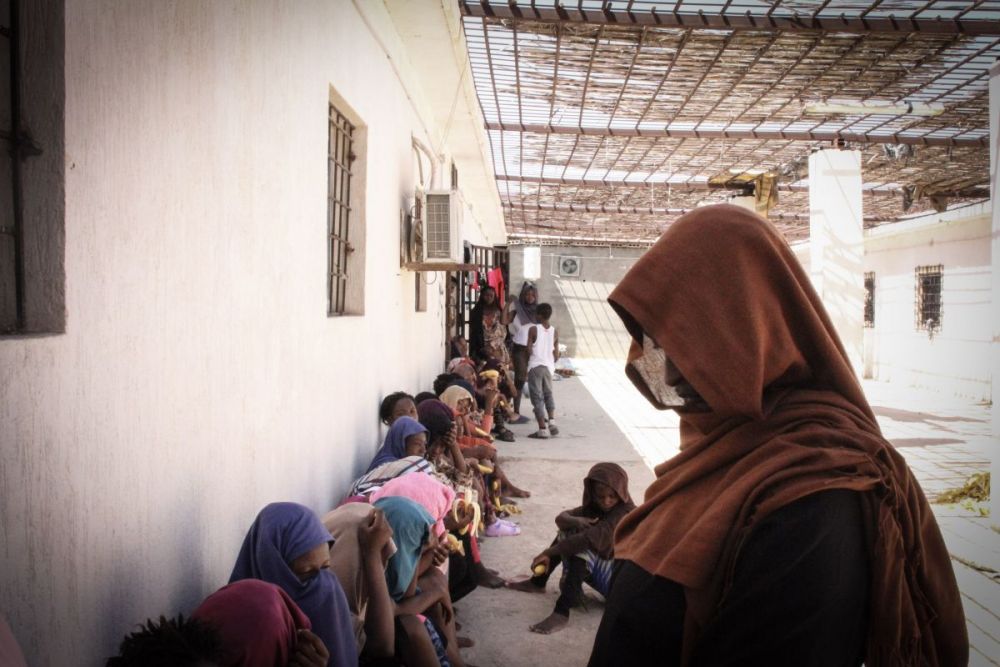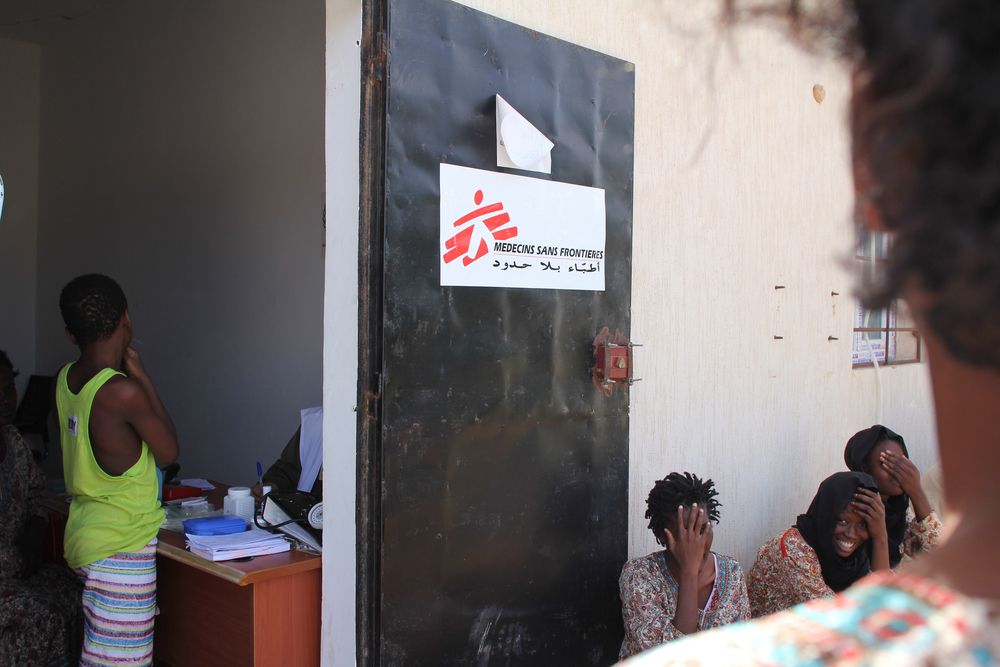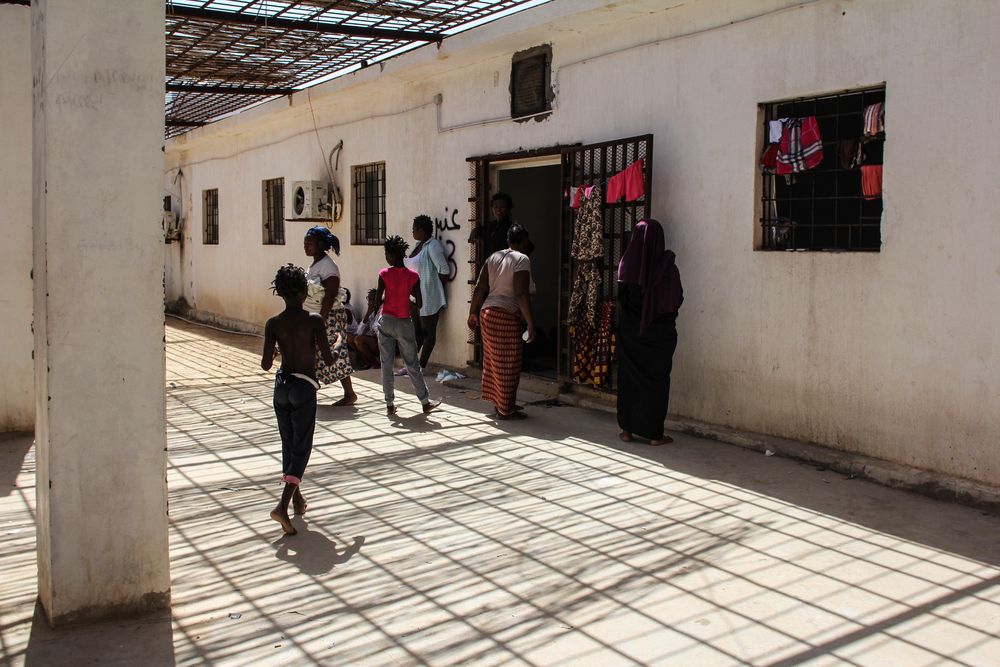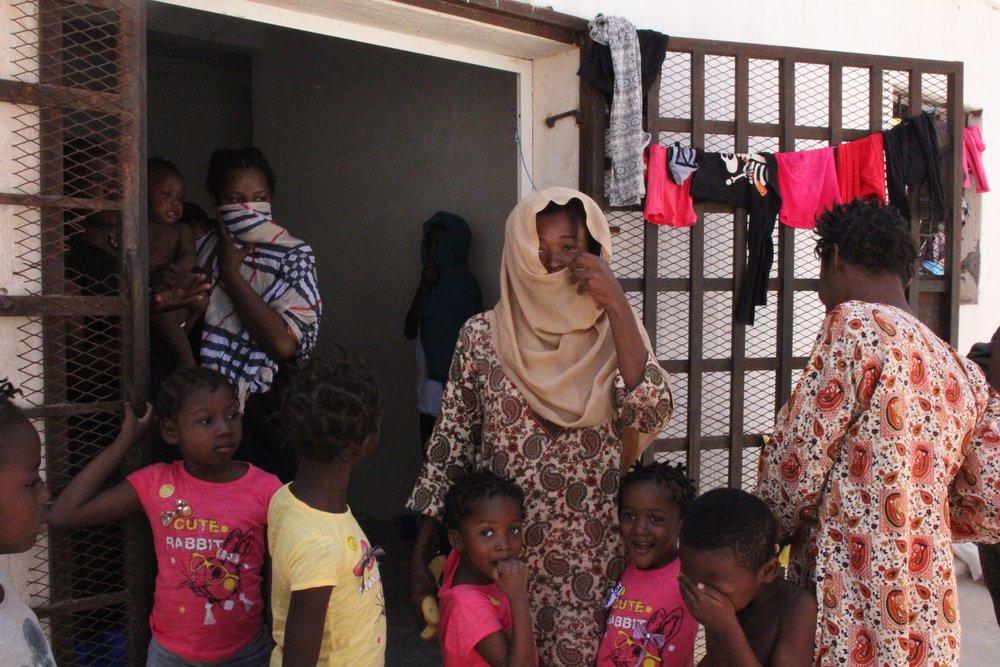By Sandra Miller, Former MSF Nurse Activity Manager in Tripoli
Below the gloomy sky of Tripoli’s Janzour neighbourhood, a woman steps out onto the terrace of her fifth-floor apartment and carefully hangs a damp collection of colourful laundry to catch the morning breeze.
Across the street, barbed-wire walls block both her eyesight and the fresh air alike from falling upon the raggedy shirts and upside down shoes hanging from the dirty walls inside Anjila detention centre, where more than a hundred refugees and migrants are locked within.
Outside, the team of MSF health workers that I have been with over the past six months arrives at the heavily guarded detention centre with medicine, supplementary food rations, and a carton full of notebooks. The day’s objective: attempt to treat both the physical ailments and the vital mental health needs of refugee and migrant detainees.
These people suffer from a variety of cases which are all exacerbated by the poor and inhumane conditions of their detention, but some of the most obvious is increasing bouts of fear, anxiety, insomnia and depression.

Over the past month, each of the longstanding physical and mental health concerns for people in detention has worsened as violent clashes – the third bout in seven months – erupted in Libya’s capital city.
The fighting has endangered civilians across Tripoli’s metropolitan area and has put over three thousand trapped refugees and migrants at imminent risk of being killed or seriously injured as indiscriminate shelling, gunfire and airstrikes surround the detention centres.
As we enter the premises of Anjila and begin to prepare for the work ahead of us, a large group of some eighty men are taken out of an overcrowded cell and ordered by the guards to sit on the ground in rows of ten. Many of them look barely alive.
With blank stairs and faces void of emotion, their attention settles reluctantly upon on a young woman standing before them in a white vest with a red logo. Balkees Mgadami, a 24-year-old Libyan translator, speaks up with a calm but commanding voice that defies her fragile appearance.
“Good morning everyone. We are Doctors Without Borders.”

Changing gracefully between Arabic, French, and English, my colleague explains that doctors, nurses, and mental health workers come to the centre every week to provide medical care.
At the end of her introductory speech, she adds one easily overlooked but important point, “Today we will distribute notebooks and pens. If you have ideas, or drawings you want to make, that can help.”
It is a simple enough gesture, but one that makes a world of difference to people who have gone through so much and now have so little freedom. Many have experienced deeply traumatic episodes of torture while being held by human traffickers.
Others have seen their loved ones drown before their eyes while trying to flee across the Mediterranean Sea, only to be intercepted and returned back to Libya.
“People are overthinking because they are kept in a place where they are doing almost nothing,” says Hisham Sofrani, MSF Social Worker. “From a mental health perspective, when you are blockaded in a new situation which is very hard, and you cannot see choices or options for you, you will keep flashing back to your past experiences, especially the negative ones.”
Mental stimulation through writing, drawing, and games of tic-tac-toe can be a therapeutic means to help people express themselves and deal with the dangerous circumstances they are confronted with on a daily basis.
It can also help build the social fabric among people in detention who all have different nationalities, ethnicities, and experiences. In detention, it turns out that the pen may be mightier than the sword and the pill combined.

“We’re not saying they will be fine, but we are minimizing the consequences of being detained. [We are trying to] empower people to show them the coping mechanisms, the activities they can do to survive,” says Sofrani. “The most important thing is to survive.”
While medics examine patients for illnesses including respiratory tract infections, acute watery diarrhoea, scabies and tuberculosis, a small group gathers on a collection of floor mats off to the far side of the centre, where a counsellor talks about stress.
Together, they discuss what causes stress, how it links to other problems like insomnia, and ways they and their friends can cope with it. Standing up, the group takes long breathes in and out and performs simple physical exercises. The group is attentive and some even reveal a smile; they start to look alive.
Afterwards, as the day’s work in Anjila detention centre closes out, I watch uncomfortably as detainees are ordered back into their cell. In the end, people don’t just need a doctor, they need attention. They need to know that someone, somewhere, cares about them and treats them with the dignity they deserve.
Find out more about MSF's work in Libya:
Throughout Libya, an estimated 6,000 thousand refugees and migrants are currently held in official, state-run detention centres operated by the Libyan Interior Ministry. Many fled their homes in distant countries searching for safer futures, only to realize that extortion, torture, sexual violence, exploitation and forced labour were new dangers that awaited them in Libya and throughout their journeys. Having committed no crime, these vulnerable people are now held indefinitely in conditions that generally fall well below international standards and are detrimental to both their physical and mental health.
Since fighting erupted on 4 April, MSF has pled for the international community to evacuate refugees and migrants trapped near the conflict areas to the only place where they’ll be safe – out of Libya. So far, only 455 people have been moved out of the country, while between 300 and 400 have been intercepted at sea, forcibly returned to Libya in violation of international law, and placed in the same dangerous conditions of detention.
